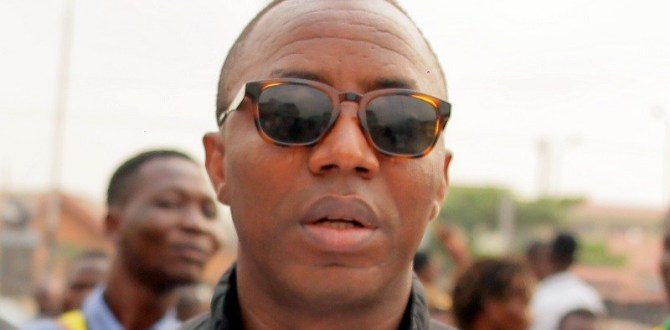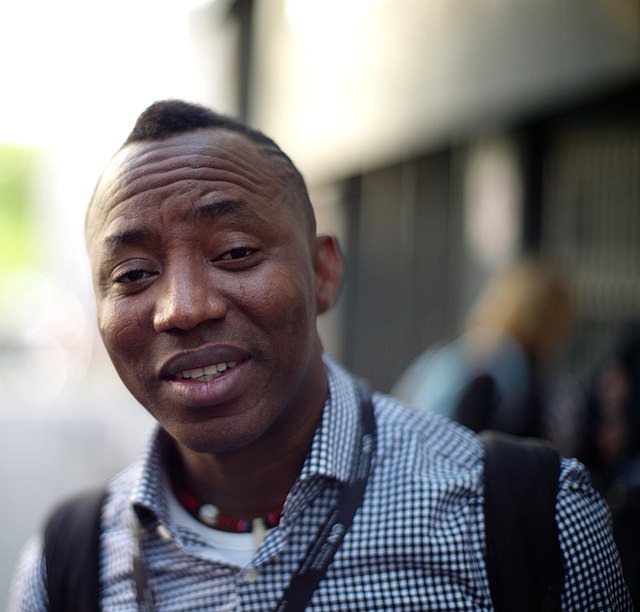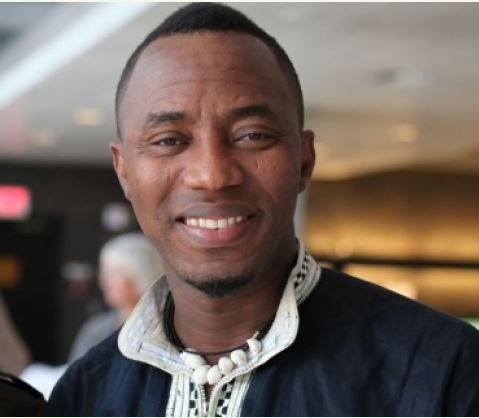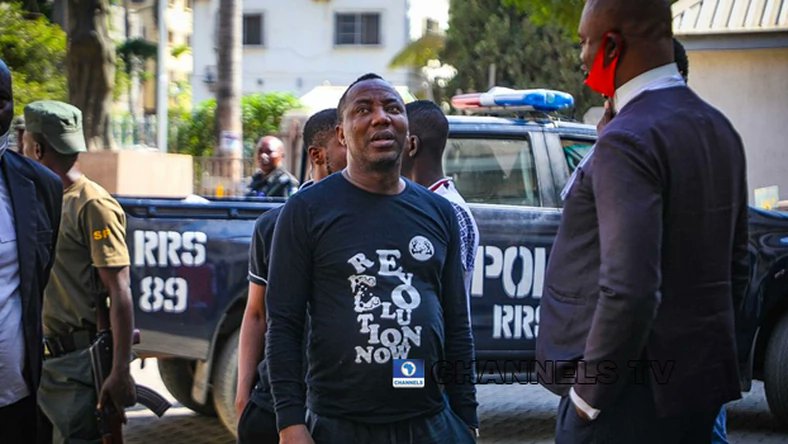By Abimbola Adelakun
On Monday, security agents not only crippled the #RevolutionNow protests against government ineptitude by deploying all the armed forces to the venue, in Lagos, but also declared such repressive behaviour a “democratic victory”. The irony of that assertion hits one hard. No thanks to alternative facts such as this one, Nigeria these days sometimes feels like being trapped inside an Orwellian reality. When presidential aide, Garba Shehu, spoke on the protests, he asserted that people did not turn up for the “revolution” because of their support for Muhammadu Buhari’s government. Shehu is paid to obscure issues, so no one ever expects him to be straight. No one also expects him to acknowledge the amount of despotic violence their government deployed in the venues of those protests to forestall popular participation.
However, one should not let them get away with his delusions that Nigerians ignored the protests because they believe in the promise of the present administration.
Indeed, one can speculate that the protests gained even far more traction with the DSS arrest of the mastermind, Omoyele Sowore. Most people – outside the clique of student union members and professional “alutaists” who have nowhere else to go on a Monday morning – would just have sat it out. A lot of Nigerians have made a psychic disconnection with the motherland, and they just cannot be moved to protest. They want to get on with their day. Presently, Nigerians are roughly divisible between those who are about to leave the country and those who are looking for information that will facilitate their migration. Turning up at protests or fighting for a revolution is a luxury that only a few people can still afford. You fight for the soul of a country that inspires your faith, not the one that serially abuses you.
Revolution.
We have been on this path before. In 1999, democracy was the revolution we thought would lead to the creation of reasonable opportunities for growth and development. Some 20 years after we started on the path of civil rule, we have now arrived at the point where democracy and its much-hyped instruments of “checks and balances” have been rigged against us. We subsist in a kakistocracy, the one where we are saddled with arms of government that lack the institutional autonomy to redress the abuses and excesses of the executive as the patriarchs of democracy once envisioned. From Abuja to the various state units, we have a “bow and go” legislature and a “technical” judiciary too fearful of executive power to exercise self-directed agency on behalf of the people.
Today, those who stood up to the military abusers are the new oppressors. Where the military chastised us with “koboko” (horse whip) and jackboots, they have chastised us with hunger and indifference to our plight. In 2015, we had another mini-revolution when the PDP was dislodged. People dared to express hope of “change” the Buhari government promised but see where we are now. Yes, a revolution can be a way out of our present condition of dystopic democracy, but what happens the morning after? Why go through the motions of getting rid of this present darkness only to implant the flag of another set of abusers who will operate the same blueprint of oppression?
For a moment, let us set aside the observation of the sadistic humour of Fate: the military ruler who upturned an elected government in 1983 is now the one jittery about his popular mandate (sic) being snatched from him. Let us focus on why he is not likely to get his comeuppance the way he fears will happen through a revolution: not many Nigerians still have either the mental or physical energy to keep investing their hopes in Nigeria. I doubt they would have devoted their energy into a revolution. That is why Shehu should know that if he did not see more than a handful of Nigerians at the demonstration scenes, the revolution did not fail. What it has done is to reveal a far grim reality that the spectacle of mammoth crowd chanting would have obscured. Who has the time to keep fighting over a country that does not even know you exist?
The reason the lesson of Monday’s protests flew over their heads is that they are dogmatically wedded to a singular definition of revolution. They think a revolution has happened only when blood is flowing in smoke-tinged streets, and the head of state is on his knees before a group of militants wielding AK47s and machetes. Their straitjacket thinking led them to arrest Sowore for a crime they cannot prove. Up till now, we have yet to be presented with evidence of his prepared manifesto that showed that he has purchased arms, mobilised people at the grass roots, arranged with dissident security forces, and he would be marching them into the fortresses of Aso Rock. Instead, what we have had thrown in our faces is a dictionary definition of “revolution.” On Sunday, the DSS PRO, one Peter Afunanya, took us through the gamut of definitions of “revolution” in the bid to convince us that Sowore was planning an insurrection. What he could not say was how any of the jargons he spewed translated into a forceful takeover of government in reality.
If we go by the surface meaning of words, some churches should be charged with treasonable felony every time they prayed that “power must change hands”! It is even amusing how certain commentators perambulated the media space using the dictionary to justify Sowore’s arrest. If they consulted credible dictionaries like Webster’s or Oxford (they use them in the US Supreme Court), they would have found that the word is polysemous. That is why nobody hounds the US Democratic Party candidate, Bernie Sanders, for claiming to lead a “revolution” in his country. Mind you, Sanders is someone who could have won the US presidency. Sowore, on the other hand, ran as a presidential candidate some months ago and did not even win a local government. So how could he have led an insurgency against the government that will percolate all the 36 states of Nigeria?
Finally, I cannot resist another observation: why should Buhari’s government fear a revolution sef ? Why are they jittery that the idea of revolution might resonate with Nigerians?
When they came into power in 2015, this government claimed they would solve three major problems of insecurity, economy, and corruption. On the three, the Buhari administration has awarded itself some inordinately high scores. Even when Nigerians say and feel otherwise, they insist they have done enough to justify the faith reposed in them. After Nigeria was declared the poverty capital of the world, they came up with a counter-narrative of having lifted five million Nigerians out of extreme poverty. They said they have empowered 12 million rice farmers, revolutionised rice farming to the point that rice factories in Thailand are shutting down because they lost Nigeria’s customers. Even electricity generation was said to have “notionally” hit 7,000 MW.
On security, they claim they have “technically defeated” Boko Haram. When you press them on the issue of militant herdsmen, they shut it down saying the blubbering bluster of the wailers is symptomatic of lack of patriotism. They insist they are fighting corruption even though the same people we were told would go on exile if Buhari became president are now going to be sitting at FEC meetings with him.
Now, a government that apportions high grades to itself on its supposed achievements should also retain self-composure when a revolution is mentioned. They should be confident that people are satisfied enough with their lot under their administration and would laugh at the purveyors of revolution. Yet, the government was so jittery it brought out more armed forces to fight protesters than they do with herdsmen. Their panic and desperation to declare “democratic victory” over an unfolding reality is telling. They fear the arousing power of assemblies to destabilise the alternative reality they have made official narratives.
And this is the point where I sit back and laugh in Genesis Chapter Four, verse Seven, the Yoruba translation.
● Adelakun writes for Punch
● Article first published by Punch














 Comments and Issues2 days ago
Comments and Issues2 days ago
 Business6 days ago
Business6 days ago
 Business1 week ago
Business1 week ago
 Business1 week ago
Business1 week ago
 Business5 days ago
Business5 days ago
 News6 days ago
News6 days ago
 Education7 days ago
Education7 days ago
 Comments and Issues5 days ago
Comments and Issues5 days ago


